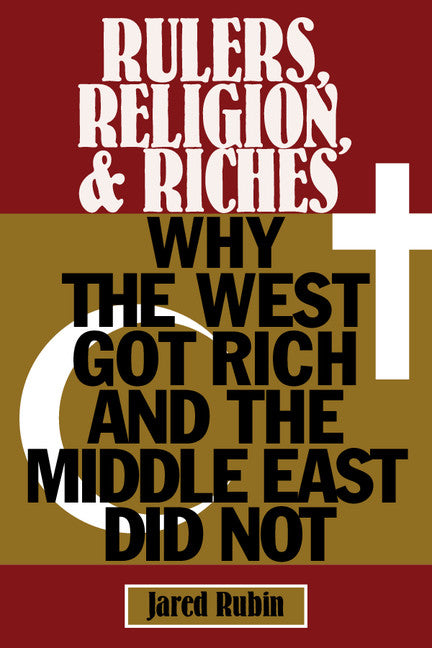Freshly Printed - allow 8 days lead
Couldn't load pickup availability
Rulers, Religion, and Riches
Why the West Got Rich and the Middle East Did Not
This book seeks to explain the political and religious factors leading to the economic reversal of fortunes between Europe and the Middle East.
Jared Rubin (Author)
9781108400053, Cambridge University Press
Paperback / softback, published 2 March 2017
296 pages, 12 b/w illus. 8 maps 19 tables
22.8 x 15.2 x 1.6 cm, 0.44 kg
'Jared Rubin is among the boldest and most creative young scholars of political economy today. His highly entertaining and enlightening book is a path-breaking magnum opus in the burgeoning field of economics of religion. Rulers, Religion, and Riches restores the pertinent role of secularism in sociopolitical and economic development to its rightful place.' Murat Iyigun, Calderwood Endowed Chair, University of Colorado, Boulder
For centuries following the spread of Islam, the Middle East was far ahead of Europe. Yet, the modern economy was born in Europe. Why was it not born in the Middle East? In this book Jared Rubin examines the role that Islam played in this reversal of fortunes. It argues that the religion itself is not to blame; the importance of religious legitimacy in Middle Eastern politics was the primary culprit. Muslim religious authorities were given an important seat at the political bargaining table, which they used to block important advancements such as the printing press and lending at interest. In Europe, however, the Church played a weaker role in legitimizing rule, especially where Protestantism spread (indeed, the Reformation was successful due to the spread of printing, which was blocked in the Middle East). It was precisely in those Protestant nations, especially England and the Dutch Republic, where the modern economy was born.
1. Introduction
Part I. Propagation of Rule: A Theory of Economic Success and Stagnation: 2. The propagation rule
3. Historical origins of rule propagation
Part II. Applying the Theory: Why the West Got Rich and the Middle East Did Not: 4. Bans on taking interest
5. Restrictions on the printing press
6. Printing and the Reformation
7. Success: England and the Dutch Republic
8. Stagnation: Spain and the Ottoman Empire
9. Conclusion.
Subject Areas: Political economy [KCP], Development economics & emerging economies [KCM], Middle Eastern history [HBJF1], General & world history [HBG]


